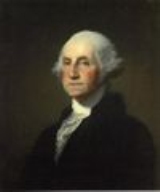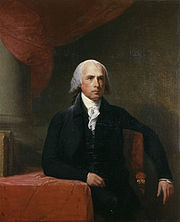
Saxbe fix
Encyclopedia

President of the United States
The President of the United States of America is the head of state and head of government of the United States. The president leads the executive branch of the federal government and is the commander-in-chief of the United States Armed Forces....
, in appointing a current or former member of the United States Congress
United States Congress
The United States Congress is the bicameral legislature of the federal government of the United States, consisting of the Senate and the House of Representatives. The Congress meets in the United States Capitol in Washington, D.C....
whose elected term has not yet expired, can avoid the restriction of the United States Constitution
United States Constitution
The Constitution of the United States is the supreme law of the United States of America. It is the framework for the organization of the United States government and for the relationship of the federal government with the states, citizens, and all people within the United States.The first three...
's Ineligibility Clause
Ineligibility Clause
The Ineligibility Clause, one of the two clauses often called the Emoluments Clause, and sometimes also referred to as the Incompatibility Clause or the Sinecure Clause, is found in Article 1, Section 6, Clause 2 of the United States Constitution...
. That clause prohibits the President from appointing a current or former member of Congress to a civil office position that was created, or to a civil office position for which the pay and/or benefits (collectively, "emoluments") were increased, during the term for which that member was elected until the term has expired. The rollback, first implemented by an Act of Congress
Act of Congress
An Act of Congress is a statute enacted by government with a legislature named "Congress," such as the United States Congress or the Congress of the Philippines....
in 1909, reverts the emoluments of the office to the amount they were when that member began his or her elected term.
To prevent ethical conflicts, James Madison
James Madison
James Madison, Jr. was an American statesman and political theorist. He was the fourth President of the United States and is hailed as the “Father of the Constitution” for being the primary author of the United States Constitution and at first an opponent of, and then a key author of the United...
proposed language at the Constitutional Convention
Philadelphia Convention
The Constitutional Convention took place from May 14 to September 17, 1787, in Philadelphia, Pennsylvania, to address problems in governing the United States of America, which had been operating under the Articles of Confederation following independence from...
that was adopted as the Ineligibility Clause after debate and modification by other Founding Fathers
Founding Fathers of the United States
The Founding Fathers of the United States of America were political leaders and statesmen who participated in the American Revolution by signing the United States Declaration of Independence, taking part in the American Revolutionary War, establishing the United States Constitution, or by some...
. Historically, a number of approaches have been taken to address the problem posed by restriction; these have included choosing another nominee, allowing the desired nominee's elected term of office to expire, ignoring the clause entirely, or reducing the offending emoluments to the level prior to when the nominee took office. Although Congress passed the mechanism reducing emoluments in 1909, the procedure was named "Saxbe fix" after Senator William Saxbe, who was confirmed as Attorney General
United States Attorney General
The United States Attorney General is the head of the United States Department of Justice concerned with legal affairs and is the chief law enforcement officer of the United States government. The attorney general is considered to be the chief lawyer of the U.S. government...
in 1973 after Congress reduced the office's salary to the level it had been before Saxbe's term commenced. The Saxbe fix has subsequently become relevant as a successful—though not universally accepted—solution for appointments by presidents of both parties of sitting members of the United States Congress to the United States Cabinet
United States Cabinet
The Cabinet of the United States is composed of the most senior appointed officers of the executive branch of the federal government of the United States, which are generally the heads of the federal executive departments...
. Members of Congress have been appointed to federal judgeships
United States federal judge
In the United States, the title of federal judge usually means a judge appointed by the President of the United States and confirmed by the United States Senate in accordance with Article II of the United States Constitution....
without any fix being enacted; court challenges to such appointments have failed.
There were four Saxbe fixes for appointees of presidents prior to Barack Obama
Barack Obama
Barack Hussein Obama II is the 44th and current President of the United States. He is the first African American to hold the office. Obama previously served as a United States Senator from Illinois, from January 2005 until he resigned following his victory in the 2008 presidential election.Born in...
. The first two rollbacks concerned appointees of Republicans
Republican Party (United States)
The Republican Party is one of the two major contemporary political parties in the United States, along with the Democratic Party. Founded by anti-slavery expansion activists in 1854, it is often called the GOP . The party's platform generally reflects American conservatism in the U.S...
William Howard Taft
William Howard Taft
William Howard Taft was the 27th President of the United States and later the tenth Chief Justice of the United States...
and Richard Nixon
Richard Nixon
Richard Milhous Nixon was the 37th President of the United States, serving from 1969 to 1974. The only president to resign the office, Nixon had previously served as a US representative and senator from California and as the 36th Vice President of the United States from 1953 to 1961 under...
, and the last two were implemented for appointees of Democrats
Democratic Party (United States)
The Democratic Party is one of two major contemporary political parties in the United States, along with the Republican Party. The party's socially liberal and progressive platform is largely considered center-left in the U.S. political spectrum. The party has the lengthiest record of continuous...
Jimmy Carter
Jimmy Carter
James Earl "Jimmy" Carter, Jr. is an American politician who served as the 39th President of the United States and was the recipient of the 2002 Nobel Peace Prize, the only U.S. President to have received the Prize after leaving office...
and Bill Clinton
Bill Clinton
William Jefferson "Bill" Clinton is an American politician who served as the 42nd President of the United States from 1993 to 2001. Inaugurated at age 46, he was the third-youngest president. He took office at the end of the Cold War, and was the first president of the baby boomer generation...
. Congress approved two more in the weeks preceding Obama's presidency in preparation for his designated Cabinet nominees. Since the 1980s, Saxbe fixes have only been temporary, extending to the conclusion of the term for which the sitting member of Congress was elected. The Clause has received relatively little scholarly or judicial attention; the sparse extant debate centers on whether the reduction of salary satisfies the Ineligibility Clause, or whether affected members of Congress are ineligible for appointment in spite of the reduction.
Background
In his notes of the Philadelphia ConventionPhiladelphia Convention
The Constitutional Convention took place from May 14 to September 17, 1787, in Philadelphia, Pennsylvania, to address problems in governing the United States of America, which had been operating under the Articles of Confederation following independence from...
in 1787, James Madison
James Madison
James Madison, Jr. was an American statesman and political theorist. He was the fourth President of the United States and is hailed as the “Father of the Constitution” for being the primary author of the United States Constitution and at first an opponent of, and then a key author of the United...
expressed the fear that members of Congress would create new federal jobs, or increase the salaries for existing jobs, and then take those jobs for themselves. Madison wrote that corrupt legislative actions, in the form of the unnecessary creation of offices and the increase of salaries for personal benefit, were one of his greatest concerns. The delegates who were present agreed that no member of Congress should be eligible to be appointed to an executive position while serving in Congress. Madison originally proposed a one-year length on such a bar. However, Nathaniel Gorham
Nathaniel Gorham
Nathaniel Gorham was the fourteenth President of the United States in Congress assembled, under the Articles of Confederation...
, James Wilson
James Wilson
James Wilson was one of the Founding Fathers of the United States and a signer of the United States Declaration of Independence. Wilson was elected twice to the Continental Congress, and was a major force in drafting the United States Constitution...
, and Alexander Hamilton
Alexander Hamilton
Alexander Hamilton was a Founding Father, soldier, economist, political philosopher, one of America's first constitutional lawyers and the first United States Secretary of the Treasury...
wanted no bar at all at the conclusion of congressional service. Eventually, Madison proposed a compromise: "that no office ought to be open to a member, which may be created or augmented while he is in the legislature"; this led to extensive debate.
The delegates eliminated the prohibition on a member of Congress's assuming holding state office based on the rationale that there might be times when it might be in the best interest of the nation to allow such service. They eliminated the one-year ban because they judged it to be ineffective in protecting the Constitution. Charles Cotesworth Pinckney
Charles Cotesworth Pinckney
Charles Cotesworth “C. C.” Pinckney , was an early American statesman of South Carolina, Revolutionary War veteran, and delegate to the Constitutional Convention. He was twice nominated by the Federalist Party as their presidential candidate, but he did not win either election.-Early life and...
moved that the states vote and the prohibition carried by vote of 8 states to 3. Robert Yates
Robert Yates (politician)
Robert Yates was a politician and judge well known for his Anti-Federalist stances. He is also well known as the presumed author of political essays published in 1787 and 1788 under the pseudonyms "Brutus" and "Sydney"...
noted that the clause "which shall have been created, or the Emoluments whereof shall have been increased" was an amendment passed in his absence, and that he did not place much faith in it as he felt unscrupulous politicians would circumvent it by creating new positions for persons who would subsequently place a member of Congress in a vacancy that they and not Congress created. Madison moved that the phrase "or the Emoluments whereof shall have been augmented by the legislature of the United States, during the time they were members thereof, and for one year thereafter." This motion failed 2–8, with one state divided. The clause was limited to "civil" offices so as not to restrict military service. Accordingly, the clause was passed in its current form without an explicit time consideration.

